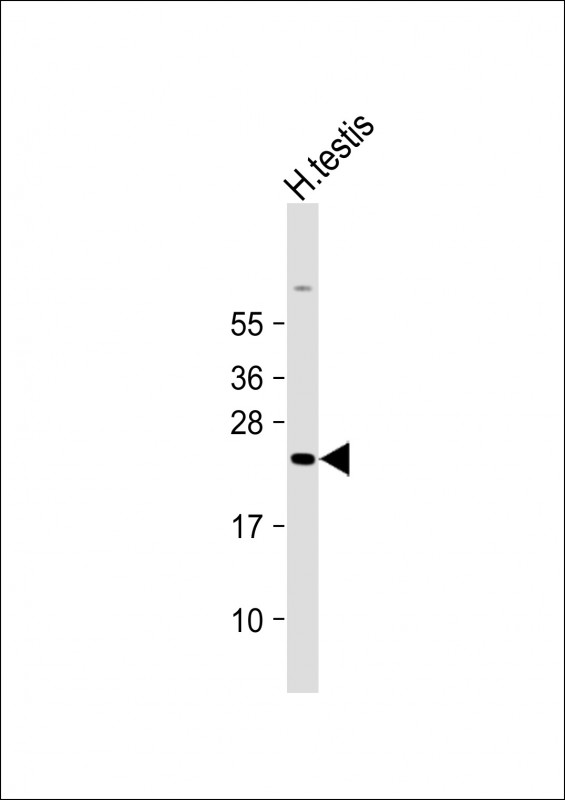H2BFWT Antibody (Center)
Affinity Purified Rabbit Polyclonal Antibody (Pab)
- SPECIFICATION
- CITATIONS
- PROTOCOLS
- BACKGROUND

Application
| WB, E |
|---|---|
| Primary Accession | Q7Z2G1 |
| Other Accession | NP_001002916.2 |
| Reactivity | Human |
| Host | Rabbit |
| Clonality | Polyclonal |
| Isotype | Rabbit IgG |
| Calculated MW | 17050 Da |
| Antigen Region | 62-88 aa |
| Gene ID | 158983 |
|---|---|
| Other Names | Histone H2B type W-T, H2B histone family member W testis-specific, H2BFWT |
| Target/Specificity | This H2BFWT antibody is generated from rabbits immunized with a KLH conjugated synthetic peptide between 62-88 amino acids from the Central region of human H2BFWT. |
| Dilution | WB~~1:1000 |
| Format | Purified polyclonal antibody supplied in PBS with 0.09% (W/V) sodium azide. This antibody is purified through a protein A column, followed by peptide affinity purification. |
| Storage | Maintain refrigerated at 2-8°C for up to 2 weeks. For long term storage store at -20°C in small aliquots to prevent freeze-thaw cycles. |
| Precautions | H2BFWT Antibody (Center) is for research use only and not for use in diagnostic or therapeutic procedures. |
| Name | H2BW1 (HGNC:27252) |
|---|---|
| Function | Atypical histone H2B that can form nucleosomes structurally and dynamically indistinguishable from those containing conventional H2B. Nucleosomes wrap and compact DNA into chromatin, limiting DNA accessibility to the cellular machineries which require DNA as a template. Histones thereby play a central role in transcription regulation, DNA repair, DNA replication and chromosomal stability. DNA accessibility is regulated via a complex set of post-translational modifications of histones, also called histone code, and nucleosome remodeling (PubMed:15475252, PubMed:16449661). However, unlike conventional H2B, does not recruit chromosome condensation factors and does not participate in the assembly of mitotic chromosomes (PubMed:16449661). May be important for telomere function and play a role in spermatogenesis (PubMed:16449661, PubMed:19583817). |
| Cellular Location | Nucleus membrane. Chromosome. Chromosome, telomere |
| Tissue Location | Testis-specific (at protein level). |

Thousands of laboratories across the world have published research that depended on the performance of antibodies from Abcepta to advance their research. Check out links to articles that cite our products in major peer-reviewed journals, organized by research category.
info@abcepta.com, and receive a free "I Love Antibodies" mug.
Provided below are standard protocols that you may find useful for product applications.
Background
Histones are basic nuclear proteins that are responsible for the nucleosome structure of the chromosomal fiber in eukaryotes. Two molecules of each of the four core histones (H2A, H2B, H3, and H4) form an octamer, around which approximately 146 bp of DNA is wrapped in repeating units, called nucleosomes. The linker histone, H1, interacts with linker DNA between nucleosomes and functions in the compaction of chromatin into higher order structures. This gene encodes a member of the H2B histone family that is specifically expressed in sperm nuclei. A polymorphism in the 5' UTR of this gene is associated with male infertility.
References
Lee, J., et al. J. Cell. Mol. Med. 13 (8B), 1942-1951 (2009) :
Boulard, M., et al. Mol. Cell. Biol. 26(4):1518-1526(2006)
Churikov, D., et al. Genomics 84(4):745-756(2004)
Churikov, D., et al. Cytogenet. Genome Res. 105 (2-4), 203-214 (2004) :
If you have used an Abcepta product and would like to share how it has performed, please click on the "Submit Review" button and provide the requested information. Our staff will examine and post your review and contact you if needed.
If you have any additional inquiries please email technical services at tech@abcepta.com.













 Foundational characteristics of cancer include proliferation, angiogenesis, migration, evasion of apoptosis, and cellular immortality. Find key markers for these cellular processes and antibodies to detect them.
Foundational characteristics of cancer include proliferation, angiogenesis, migration, evasion of apoptosis, and cellular immortality. Find key markers for these cellular processes and antibodies to detect them. The SUMOplot™ Analysis Program predicts and scores sumoylation sites in your protein. SUMOylation is a post-translational modification involved in various cellular processes, such as nuclear-cytosolic transport, transcriptional regulation, apoptosis, protein stability, response to stress, and progression through the cell cycle.
The SUMOplot™ Analysis Program predicts and scores sumoylation sites in your protein. SUMOylation is a post-translational modification involved in various cellular processes, such as nuclear-cytosolic transport, transcriptional regulation, apoptosis, protein stability, response to stress, and progression through the cell cycle. The Autophagy Receptor Motif Plotter predicts and scores autophagy receptor binding sites in your protein. Identifying proteins connected to this pathway is critical to understanding the role of autophagy in physiological as well as pathological processes such as development, differentiation, neurodegenerative diseases, stress, infection, and cancer.
The Autophagy Receptor Motif Plotter predicts and scores autophagy receptor binding sites in your protein. Identifying proteins connected to this pathway is critical to understanding the role of autophagy in physiological as well as pathological processes such as development, differentiation, neurodegenerative diseases, stress, infection, and cancer.


